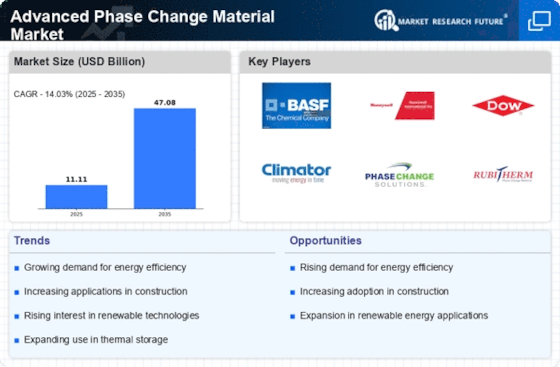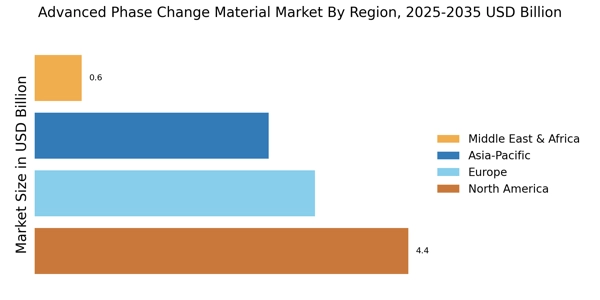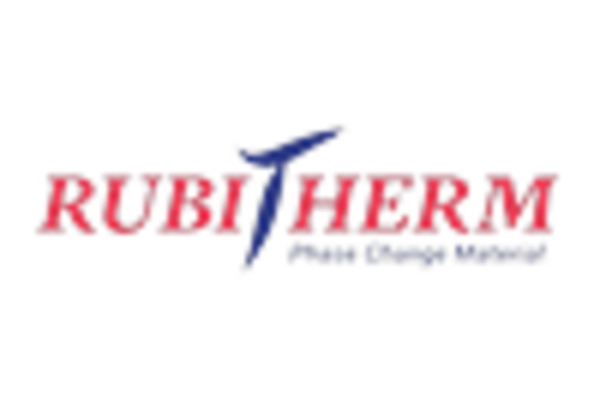Rising Energy Efficiency Demand
The Advanced Phase Change Material Market is experiencing a notable surge in demand for energy-efficient solutions. As energy costs continue to rise, industries are increasingly seeking materials that can enhance thermal management and reduce energy consumption. Phase change materials (PCMs) are recognized for their ability to absorb and release thermal energy, thereby stabilizing temperature fluctuations. This capability is particularly valuable in sectors such as construction and HVAC, where energy efficiency is paramount. According to recent estimates, the energy savings potential from implementing PCMs in building applications could reach up to 30%. This growing emphasis on energy efficiency is likely to drive the Advanced Phase Change Material Market forward, as stakeholders prioritize sustainable practices and cost-effective solutions.
Growing Awareness of Climate Change
The Advanced Phase Change Material Market is increasingly influenced by the growing awareness of climate change and its impacts. As individuals and organizations become more conscious of their carbon footprints, there is a heightened demand for materials that contribute to sustainability. PCMs play a crucial role in reducing energy consumption and greenhouse gas emissions by optimizing thermal management in buildings and industrial processes. This awareness is prompting governments and businesses to adopt more sustainable practices, thereby driving the demand for PCMs. The Advanced Phase Change Material Market is likely to see a positive impact from this trend, as stakeholders seek to align their operations with environmental goals and regulations.
Increased Investment in Renewable Energy
The Advanced Phase Change Material Market is likely to benefit from the rising investment in renewable energy sources. As the world shifts towards sustainable energy solutions, the integration of PCMs in renewable energy systems, such as solar thermal energy storage, is becoming increasingly prevalent. PCMs can store excess thermal energy generated during peak sunlight hours and release it when needed, thus enhancing the efficiency of solar energy systems. This capability aligns with the global push for cleaner energy alternatives, potentially leading to a significant increase in demand for PCMs. Analysts suggest that the renewable energy sector's growth could propel the Advanced Phase Change Material Market, as stakeholders seek innovative solutions to optimize energy storage and utilization.
Expanding Applications in Various Industries
The Advanced Phase Change Material Market is witnessing an expansion in applications across diverse sectors, including construction, textiles, and electronics. The versatility of PCMs allows them to be integrated into various products, enhancing their thermal performance. For instance, in the construction sector, PCMs are increasingly used in building materials to improve energy efficiency and occupant comfort. In textiles, they are incorporated into clothing to regulate body temperature. The electronics industry also benefits from PCMs, as they help manage heat in devices, prolonging their lifespan. This broadening of applications is expected to contribute to a compound annual growth rate (CAGR) of approximately 20% in the Advanced Phase Change Material Market over the next few years, indicating a robust growth trajectory.
Technological Innovations in PCM Development
The Advanced Phase Change Material Market is being propelled by ongoing technological innovations in the development of new and improved PCMs. Research and development efforts are focused on enhancing the thermal properties, stability, and cost-effectiveness of these materials. Innovations such as microencapsulation and the development of bio-based PCMs are gaining traction, offering enhanced performance and sustainability. These advancements not only improve the efficiency of PCMs but also expand their applicability in various sectors. As technology continues to evolve, the Advanced Phase Change Material Market is expected to witness a surge in new product offerings, catering to the diverse needs of end-users and driving market growth.
.png)

















